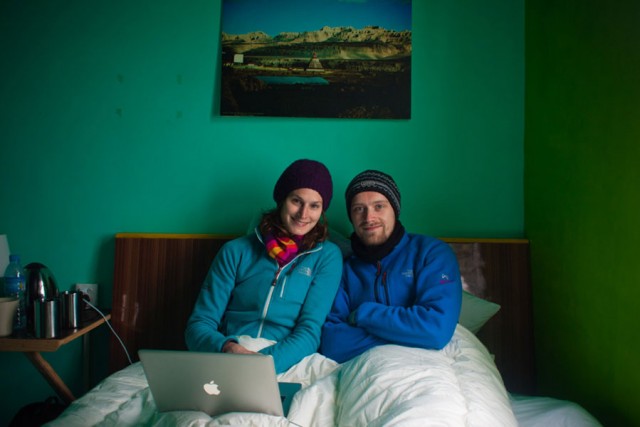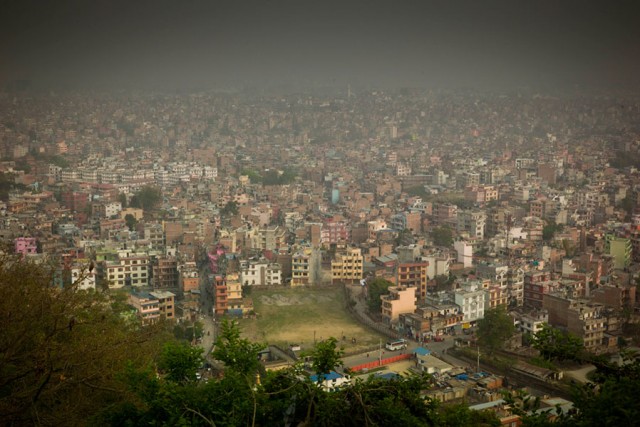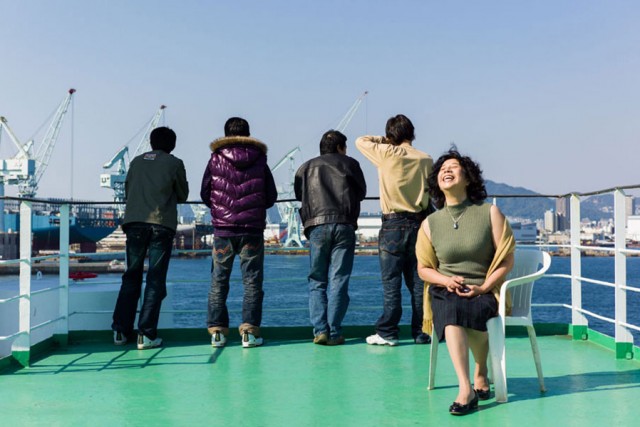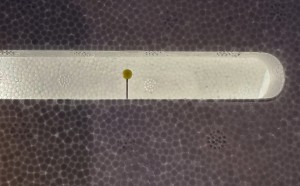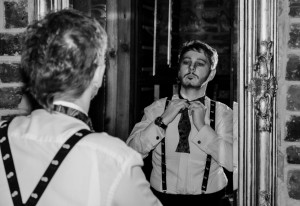Not Work Related
How do you pursue photography as a passion and an artform when your day job consists of studio photography and branding? We speak to two people with the determination and talent to make it work …
We first came across Helen Roscoe and David Rutter through their beautiful travel photography blog, Not Work Related. Scenes of skateboarders partying in LA, village girls off to school in China, street festivals in Bali, trekking around the Everest region in Nepal … their portraits are quiet, incredibly detailed, and soaked in colour, capturing odd moments that are insightful, very human, and often very funny.
What better way to encapsulate a Japanese arts festival than zooming in on a line-up of coral pink Godzillas? Or sum up the entire idea of tourism by following a man dressed only in marble-effect Speedos, clutching a camera, marching confidently down an Indonesian village path? One image of Everest (between Namche Bazaar and Thame) is just so enormous and barren; black and white film is an oft-used technique, but here it’s completely fitting. Cue somewhat paranoid thoughts of being left behind, survival style (think Into Thin Air or Alive), with a broken leg in the freezing landscape. Maybe that’s just us …
Perhaps the best thing about their work is the way the photos capture the entire ‘tourist’ experience; the intense temporary feeling that you get from a one-off period of time in another unknown country; one of voyeurism and souvenirs, yes, but also the complete wonder of being exposed to the unfamiliar; braving cultural differences or a language barrier; sharing a familiar look or finding a universal language. Colossal representations of natural isolation, featured alongside intimate contemplative moments, and then split-seconds of friendship, laughter and community.
This kind of sums up Not Work Related, set up by Helen, a fashion and portrait photographer, and David, a graphic designer, to showcase their combined love of photography and adventure. The blog came out of a frustration of spending too much time working with corporate clients and not enough on exploring their own creative ideas. In 2010 they both “handed in our notice’s and pulled the plug on freelance work”, leaving them time to head off on their travels, focus on making artwork again (which they also now sell as lovely limited edition prints), and just get their priorities sorted.
“I’ve never really been that fussed about travelling,” David explains. “I just wanted to get into work and get experience, but after working for four years [in the same area of design] I wanted to do something different before anything too big came along. In some ways, the photography became a reason to go, like a mini brief. I didn’t want to bum around, I wanted to see new places and capture what we saw. Some places were, of course, quite touristy, and some were really off the beaten track … we both hoped it would inspire us.”
“It was about keeping your eyes open and soaking up other cultures … seeing things that inspire you … and capturing what was real.”
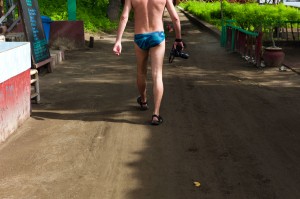
David, a print and branding specialist, studied Interactive and Screen-based Graphics (interactive design) at Lincolnshire University, before working for clients as diverse as McDonalds, Bacardi, Camel cigarettes and Unilever. Helen, a self-employed commercial photographer with a background in fine art and painting, completed an MA in photography from De Montfort University, before working on a portfolio that specialised in Fashion, Portrait and Beauty. Aston Martin became a regular client for lifestyle shoots, attracted to Helen’s personal take on the people and lifestyle around the brand.
A commercial portfolio is often seen as at odds with an artistic portfolio; it’s natural to feel cynical about work that pays the bills as being empty or ‘surface’, and exhibited work as more worthy. It’s about the content, isn’t it? For a photographer, however, freelance commercial briefs can add skills, patience, and an eye for detail that is needed to raise an artistic image to greatness. Alongside the odd really creative project (the image of Helen and David in bed in Nepal, above, is from a series featured in a current Association of Photographers exhibition), both spent years searching for and trying to secure regular work; doing work for free to try to build up portfolios and diversifying into areas that they weren’t necessarily thrilled about. Looking back on working for chain Venture Photography, Helen is very aware of the positives and the negatives.
“To be fair, what I gained from that socially – working with groups of people and children, a wide variety of people and skills – I grew a lot in confidence. I was inspired to go self-employed. I tried to do a little bit of event photography, weddings, fashion shoots, to get a bit of a platform. I did a lot of work for free at the same time.”
As well as enhancing her artistry, the ‘money job’ did encourage Helen to pursue portraiture in her artwork, with equipment she wouldn’t normally use, and to take the plunge into capturing subject matter that had previously seemed too distant to attempt.
“If we hadn’t [gone travelling] we may never have gone … it really inspired the way we work now. We bought a Leica camera which really transformed what we were doing, you have to really think about your actions. It’s not a point and shoot, the lens is different, it doesn’t focus automatically … It’s a completely manual process. You can really get playful (for instance street photography works really well), it’s small and looks old so it doesn’t phaze people. I end up using it on shoots now!”
Their top tips for travel photography? Respect cultural values and individual privacy. Even if there is a language barrier, just a look or a smile can help: “If people react warmly then it’s safe to say that they don’t mind their picture being taken.” Using a smaller camera helps; you can avoid being too invasive, but you can be a bit more experimental. Taking a smaller kit makes it easier to get better results. “Don’t be afraid to hold the camera low or high. Sometimes it’s much more interesting when the picture has ’gone wrong’, like there’s half a face cut off. Give it a go and never delete anything!”
So if you’re thinking work is becoming a bit too much like, well, work, why not rediscover your creative side? Whether that’s changing the scenery altogether, or maybe just changing your camera lens, take a leaf out of Helen and David’s book.
“We’d like to think it could evolve; we’d like to inspire people to do things Not Work Related, such as having an allotment, or helping someone out, or forming a little community … just doing something for free or just for the good of it. That’s the dream. And on the flip side, we do It’s Work Related, and that’s what pays the bills.”
All images courtesy Not Work Related

